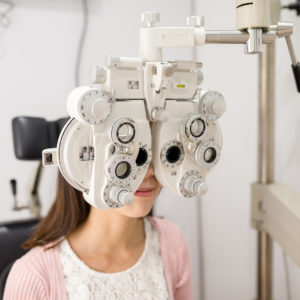Opternative is a Chicago-based startup that makes it more convenient and less expensive for patients to receive refractive eye exams and prescriptions for eyeglasses or contact lenses.
Opternative conducts eye exams through its HIPAA-compliant online portal, and each prescription is certified by an ophthalmologist. Opternative cites its clinical study showing its methods to be safe and accurate; in an independent side-by-side clinical trial, the Opternative eye exam was as accurate as a traditional refractive exam performed by an optometrist or ophthalmologist using a phoropter. Yet some states are banning the technology that makes this possible.
While this story focuses on one highly specialized service, the ramifications for healthcare in general go further. To what extent does the government trust patients and providers? To what extent can digital technologies reduce the costs of health care? Will cutting-edge American healthcare technology be available in parts of the world where access to healthcare is limited?
Opternative was founded in 2012 by Aaron Dallek and Steven Lee. Lee, an optometrist, had performed more than 20,000 refractive exams and found them overly time-consuming and inconvenient for patients. Standard measurement instruments and techniques had seen little to no innovation in the last 75 years. Dallek was a serial entrepreneur who, at age 28, had already founded six companies.
Instead of visiting the physical office of an optician, optometrist or ophthalmologist for an eyeglass or contact lens prescription, Opternative patients take their refractive eye exams online at home, using a computer and a smartphone. The patient’s smartphone operates like a remote control, and the computer screen works like a digital eye chart, similar to what you’d see at a doctor’s office. A series of simple audio instructions guides the patient throughout the exam.
Important: Opternative provides only a refractive eye exam, not a health screening. The company recommends all patients receive a comprehensive eye health exam every two years to test for glaucoma, macular degeneration and other health conditions.
The Opternative exam asks the patient a series of questions to determine eligibility. For example, patients under 18 and over 50 years old are not eligible to use the service. Also, in accordance with the American Academy of Ophthalmology’s recommendations, Opternative does not allow patients to use its prescription services more than four consecutive times without receiving an in-person eye health exam.
Once the Opternative exam is complete, an ophthalmologist reviews the patient’s results and medical history, and writes a prescription. The patient receives an eyeglass or contacts prescription for $40, or both for $60. An Opternative prescription can be used anywhere to purchase glasses or contacts. For comparison, the average cost of an in-office eye exam in the United States is $85.
The Institute for Justice, a Washington-based law firm devoted to economic liberties, is representing Opternative in legal action against the state of South Carolina, which has forbidden the company to operate there. This follows similar prohibition by the state of Georgia. Those opposed to Opternative in those states included the American Optometric Association and their state associations.
Controversies over self-administered diagnostic techniques are not new. When home pregnancy tests first appeared, many doctors and others wanted them banned. Patient-administered tests, they feared, would lead to suicides, neglect of healthcare, and reduced physician income. Today, home pregnancy tests are the norm, with salutary effects on pre-natal care. And unlike home pregnancy tests, each Opternative exam actually involves a medical doctor.
One of the motives for Dallek and Lee was an understanding that the costs of traditional examinations — money, time off from work, travel to an office — discourage some patients from seeking care in the first place. Plus, the high cost of traditional exams and glasses can be an economic hardship.
Dallek sees a larger issue. Opternative, he feels, is building a technology in the United States that can bring better optical care to people around the globe for whom traditional exams are not feasible. And, he sees Opternative as a prototype for other areas of health care.
But all of this rests on states allowing companies like Opternative the leeway to practice in nontraditional ways.

